Portland ballot returns for tomorrow’s election are trending low. Optimists hope it is due to procrastination, but some vote watchers are becoming alarmed.
Since 2008, an average of 64% of Portland’s registered voters have participated in City Council Elections. This year, one day before the election, only 19% of Portland voters have returned their ballots. As the graphic above shows, this is part of low returns for Multnomah County in general, and is off-trend for elections since 2016. Keep in mind that interpretation of these graphs is complicated by a couple of things: 1) the 2022 election, shown with a green line, was not a presidential election—turnout for these off-cycle years is always lower and 2), Oregon changed its ballot return rules in 2021 to allow for ballots postmarked the day of the election to be received for up to seven days. The full procrastination-effect of the new postmark rule has not yet been tested in a presidential election year. (The high-propensity voters of 2022, the off-year, mostly got their ballots in by election day. That might not be true of the larger voting public in a presidential year.)
The yellow bars in the graph show Multnomah County ballots which have been returned over the past couple of weeks. The last bar, today’s return, was disappointingly low, and below the 2022 election line.
Count former Portland City Commissioner Amanda Fritz in the worried camp, as the re-tweet and comment from transportation designer Jarret Walker shows.
Multnomah County’s election dashboard (below) tells the more complete story. The table at the lower right shows Portland ballot returns of: 15% for District 1; 19.5% for District 2; 20% for District3; and 22% for District 4.
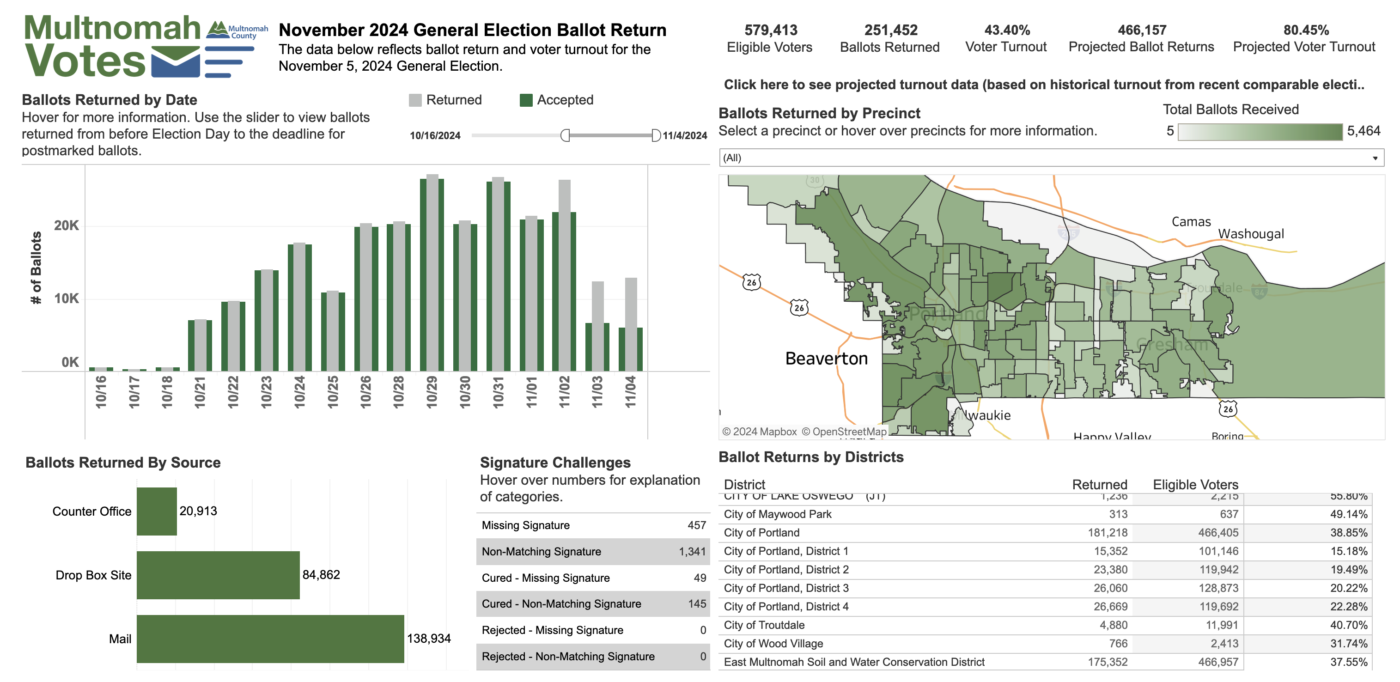
Statistics from the North Star Civic Foundation, a Portland non-profit with a focus on democracy, show that, since 2008, an average of 64% of Portland voters have participated in City Council elections.
I don’t think I have ever been in a position of hoping for procrastination, but here I am. It would be a shame if Trump took Oregon because Portland voters didn’t get their ballots in. Vote folks!





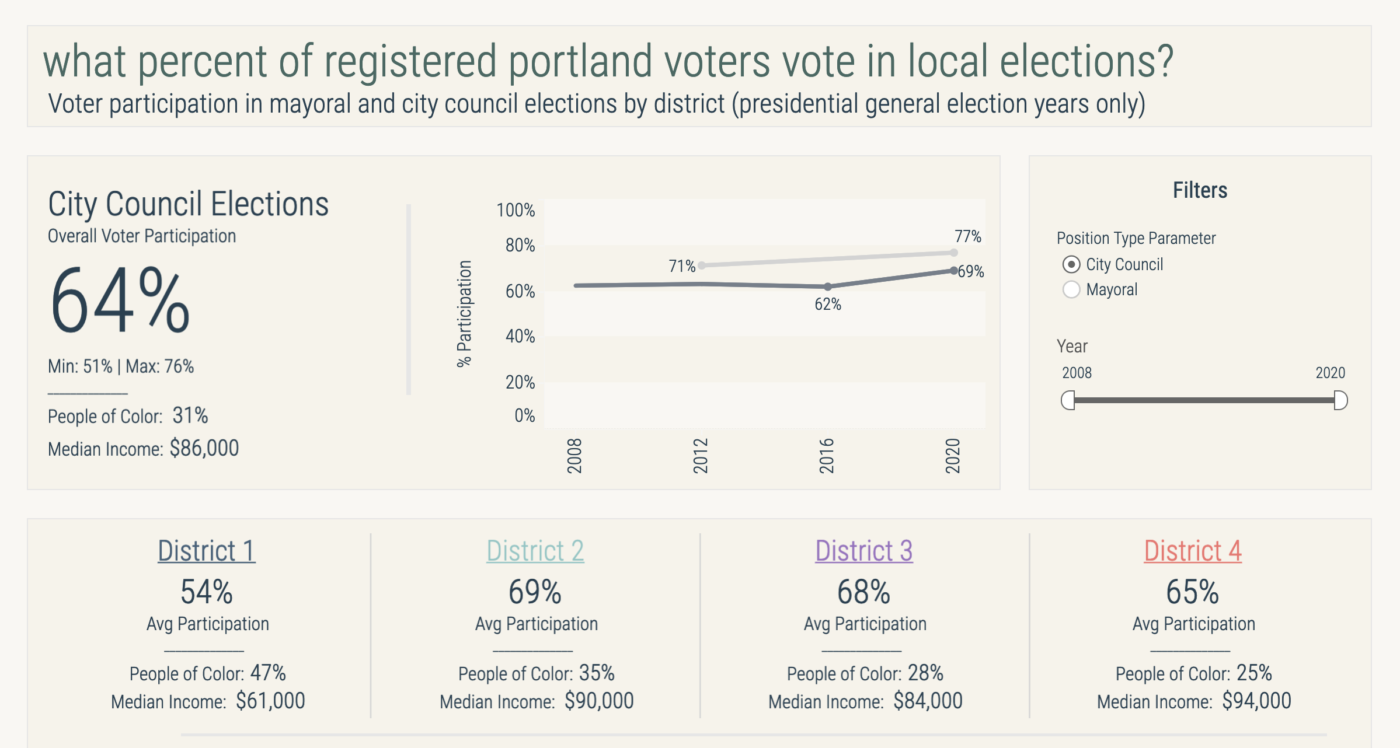
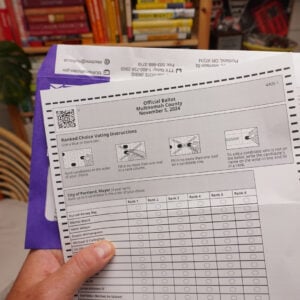
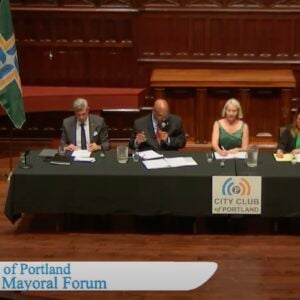

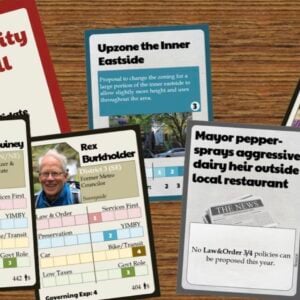
Thanks for reading.
BikePortland has served this community with independent community journalism since 2005. We rely on subscriptions from readers like you to survive. Your financial support is vital in keeping this valuable resource alive and well.
Please subscribe today to strengthen and expand our work.
The numbers just changed — I guess that is to be expected. The Mult Co election dashboard no longer has a row for each City Council District, but is reporting City of Portland returns, as a whole, at 43%.
The discrepancy between the total turnout (43%) and each district turnout (15%-29%) that you got earlier may be the difference in folks voting at all on the one hand, for president for example (a larger number and participation rate), and those who are voting for not only the president but also for city councilors on the other hand (a smaller subset of the first number). Not everyone fills in all the bubbles available to them on a ballot – I myself will often skip votes where there’s only one candidate listed (court positions for example, or uncontested legislative seats) – and given the possibility of filling in 6 bubbles for 30 possible candidates for mayor and/or 3 district councilors, many voters may simply not give a **** about any of them (“none of the above” would be a nice option on any ballot), but do care about who is going to be the next president. The unfilled ballots are still valid, they just won’t be counted in the city council elections.
Interesting, when you compare the number of eligible voters versus the overall population of each district, you realize that fully a third of District 1 residents are not eligible to vote (101K versus 154K), apparently a much higher ratio than the other districts. For years East Portland has always had a much lower turnout than the rest of the city, now we have a slightly better notion of why that is.
Immigrants and kids in East Portland v. engaged transplants everywhere else.
Aye Carumba. Have years of feckless, ineffective local politicians dulled Portland’s civic responsibility? Between the “what the heck is this” ballot and the “who the heck are these people” candidates, voting took a little more effort than last time, but nothing insurmountable.
VOTE PEOPLE It matters
When the far right constantly does whatever they can to steal an election is it any wonder why many citizens have just given up figuring the whackos will win in the end?
Are there a lot of far right folks waiting in the wings in the wilds of eastern Oregon to pounce, move the Capitol to La Grande and take over?
My dad’s family in Wallowa County are a lot more put together then my mom’s educated Brahmin family from Pune, India, a city that gave us the disrespectful DSA leader Kshama Sawant in Seattle and many of Americas upper management in the tech field.
LaGrande is a boring place with a charming downtown straight out of the 1940s like so many towns in Oregon.
The harsh climate, low salaries and expensive housing, are the main drawbacks to living there. Supposed right wing nut jobs are thin on the ground and don’t factor at all.
It’s also the headquarters location of the only armor (Abrams battle tanks) in Oregon/Idaho. Infantry, scout and armor make up the 3-116 Cavalry Regiment with units in Oregon and Idaho which is unusual in the Guard. I was stationed there for awhile. It might look sleepy and dusty, but there are compounds out there and a different attitude than some along the I5 corridor are used too. Not too many places in the PNW where one can stop by a gas station and pick up an army field manual on booby traps and survival skills.
Yes, what you say is also true. But when we start to look at people as individuals we can be surprised how little politics matter.
In 1955, my grandma, a new age glamour puss from Boston, left my dad and grandpa on the ranch in Lostine saying she couldn’t live with those rednecks one more minute.
Fast forward to 1995 and she moved back to Joseph and found plenty of takers for her kooky past life counseling sessions and had many close friends all throughout the county who would even say they liked her terrible vegan cooking.
Absolutely agree!
I have my fingers crossed that a lot of people in Portland and Seattle feel the same way!
Yeah those MAGA people have so much influence over Portland, Oregon.
You are just so right. Must be those Antifa fascists who are destroying ballots around the Metro area. I’m so glad you were around to open my eyes to the real truth.
I usually don’t submit my ballot to the last couple of days, so I am not necessarily causing a disturbance in the statistics. However, I did spend several hours on my district choices yesterday, watching interviews, reading endorsements, talking about it. Mostly on choices 4, 5, and 6. It was fun. I learned a lot, and I’m not surprised that it is taking people longer to drop off their ballots.
Thanks Lisa for sharing this nudge to get those ballots in! I’m hopeful that the most recent day’s count is a bit off – I dropped my ballot inside my local library on Sunday, and heard many others do so during the ~40 minutes I was completing it. I have yet to get a text from the County that my ballot was received, leading me to think there’s a delay in processing those.
But as I write this there are still 28 hours to get that ballot in – make the most of them!
I have yet to receive my text, but the info over at
https://multnomah.ballottrax.net/ shows me as received and counted after dropping my ballot late last night, I’m sure there’s some discrepancy between boxes and districts but I’ve been pleasantly surprised at how quickly things are processed everytime I’ve voted here.
My wife and I drop off our ballots the day of, makes us feel like we’re part of the moment (Election Day).
These numbers are hard to follow – how does 251K returned out of 579K eligible (43%) square with the 19% “one day before the election” ?
My husband also thought I wasn’t real clear with that. Multnomah County is larger than Portland. The top graph refers to Mult Co voters, so do the top-line stats of the Mult Co Dashboard. I’m getting the CoP stats from the breakdown in the lower right corner of the dashboard.
Otherwise, I’m just reporting the numbers they are outputting.
(Also, just noticed that my editor removed my final chart of stats. I’ve re-inserted it.)
The numbers on the election dashboard just changed, and they did away with counts by City Council district. (Thank God I have a screenshot or I’d think I was nuts.) They are now just showing City of Portland, and they have the return at 43%.
I worked very close to Multnomah County building for years. There was always a line for ballot drop-off on election day. My perception is simply procrastination of area voters. Don’t get your panties in a bunch just yet. Portland will come through.
I detect anxiety in your piece. Did you vote yet?
Yeah, a couple of weeks ago.
I detect confusion in your post – if everyone always procrastinates, the numbers this year should be similar to previous years, but they aren’t. Hence the article.
Point taken.
The “student” syndrome. Wait until it’s absolutely due.
I have never missed voting in a single election that I’ve been eligible for over decades. This ballot was so difficult to understand that it took me a while to decide how to use it. For voters who have lower likelihood of voting I can totally see how it just makes them throw their hands in the air and say f-it this is too much to deal with.
A new voting system (ranked choice), a new city council structure, and no incumbents running for mayor or city council surely made this more work for a lot of people. I voted, but about a week later than I usually do.
Good points. And it was the first time we had no clarifying primary contest prior to the general election.
Now that I’ve experienced ranked-choice voting, I can’t wait to vote Yes on the citizens’ initiative to abolish it (it’s coming – just you wait).
Why I voted no on 117.
When people see that the person who got the most first place votes doesn’t win the mayorship, or gets the same seat at the table and the same council vote that someone who got less first place votes, they will grumble.
Why does the winner in a city council district get the same vote on the council as the third place person?
“they will grumble”
Just wait until a black candidate gets the most first place votes but the seat is given to a white person.
RCV requires a level of civic maturity I’m not sure we have.
Because it allows a cross-section of voices to represent as many people in the district as possible. Not everyone will get their first choice, but most will get their second, third, or fourth choice. If you live in a place that’s maybe dominated by 60% Purple Party and a 40% Yellow Party minority, Purple Party is going to win every time in a single member, head-to-head election. But if you allow three people to be elected from that particular area using a single transferable vote, then you’ll expect to see something like a popular Purple Party candidate, a somewhat less popular Purple (maybe someone a bit more inexperienced but with promise, or willing to buck the party on some key issues or something), and a favorite of the Yellow Party. That may not be enough to give Yellow Party a majority in the Color Council, but they’ll at least have a voice in the room and be able to contribute to at least some policy discussions and outcomes. Representation matters, even for people in the minority, and this new system allows for that better representation.
“Color Council”
Does your analysis still hold when you have 30 candidates, each of whom is a different color?
Yes. All but a handful of the 30 different colors were niche, unpopular candidates who were quickly and easily eliminated. Their voters either had their ballots exhausted (which is the same thing that happens to third party voters in almost all election, except instead of “exhausted” we just say “defeated”) or their votes transferred to a more popular candidate. The end result is still that many people got their first choice, and most got their second, third, fourth, fifth, or sixth choice. I think there are very few people who are voting unpopular nobodies at every rank of their ballot.
For what it’s worth as a single anecdote, (according to the Tuesday report, which may change as more ballots are received and counted) my vote for Teacher Tiffany very likely stayed with her right through the very last round of transfers. There’s a small chance that my vote got transferred to my second choice, Angelita Morillo, when Tiffany had a few surplus votes that could be redistributed. And my fourth choice, Steve Novick, is winning outright on the first round. That’s an overall district result that I can be very happy with, and I suspect most voters in District 3 would say the same, because almost everybody gets somebody that they think more or less represents their interests.
On the other hand, under the old system, why does a person who may only have gotten 40% of the vote get to speak for everyone?
Because eligible voters who can’t be bothered to participate in the democratic process are effectively handing the decision to others to make for them. For example, in 2016 Trump was elected by about 26% of eligible voters because nearly half of those who could have voted or could have registered to vote didn’t bother to do so.
Honest question: Why?
Maybe we had totally different experiences, but I was thrilled that I could rank my #1 choice instead of settling for my #3 or #4 choice because they were “most likely to win”. This will be the most representative ballot I have ever cast, and to me that’s awesome. I never want to go back to the old system.
And I mean sure, the presence of so many candidates increased the time required for research, but for most folks that’s a problem easily solved by voter guides from their preferred source, and the increased participation comes with a ton of upsides (more direct engagement between candidates and voters, dilutes the impact of wealthy donors/interest groups, each candidate’s campaign helps build networks of folks with shared interests, etc)
This a million times. It was *two contests* where you even had to think about ranked choice (three if you count voting yes to have it state wide).
If you had heard nothing about it at all, it might be a surprise when you see that part of the ballot. But the instructions *on the ballot* (never mind extra documentation that came with it or flooded your mail box for months) are more than enough to clarify the process. It is not complicated and I don’t believe it goes one iota to explaining turnout. If anything, I think the turnout might be blamed on depressing presidential race.
But the ranked choice voting was the best part of the ballot. It is so freeing. You can just vote for who you want to win, it’s that easy.
“I think the turnout might be blamed on depressing presidential race.”
You mean because Portlanders are ambivalent about the chance to vote against Donald Trump in one of the most consequential races of our lifetime?
If voter participation is low, it is 100% because of the ballot.
I think the ranked choice ballot would have been less daunting if there weren’t 25-30 candidates in each city council district! I suspect that things will settle down and we’ll have fewer candidates in future elections. But too bad the confusion had to happen in a presidential election year.
Yeah, I think there’s two things going on: 1) People were just excited about the new government and the ranked choice system we adopted, and a bunch of political novices who thought that running for office is easy decided to throw their hat into the ring. Now that we’ve gone through an election and people can see that it’s still largely the established community leaders getting elected, there will be less enthusiasm for random people to go through the effort and expense of running next time around.
2) The barrier to entry onto the ballot is just really low. Portland could (and arguably should) pretty easily adopt rules that require demonstration of some nominal baseline level of support that indicates that your candidacy is at least worth the paper and ink its printed on. If someone needs about 10,000 votes to get elected, then I think demonstrating donations or signatures from even just 5% of that, 500 people is very reasonable and not a terribly heavy lift. If the current District 3 results are an indication, a requirement of 500 backers would have cut the ballot from 30 candidates to about 14.
I wouldn’t call it procrastination so much as “research is a bigger investment now, so if you’re not simply following a voter guide then you need more time to read up on everything”. Even then, I wouldn’t be surprised if there were a lot of folks agonizing over the presidential race up until the last minute.
We got together with friends on Friday for a “ballot party”, and the process took about 4 hours. Much to my surprise it was Measure 118 research that took up the most time, but City Council research was a close second. We dropped our ballots off at the post office today.
Hope you voted no on 118, it’s a sign when the majority of money to fund a measure (signature gathering) comes from outside Oregon.
It would be dark comedy for sure. Especially once you layer in the odds he wins Portland is effectively zero, yet the lunatics will still destroy Portland in their tantrum.
The Electoral college has made our presidential vote meaningless, we don’t have a Governor race or meaningful congressional race.
The idiotic ranked choice ballot with insane amount of candidates has probably given people pause after they looked at it….
I think the vote total will end up OK but low compared to the last 10 years.
The ranked choice along with the new council format at the same time will make it impossible to judge whether one or the other even worked for a couple years.
Portland has to keep being a Guinea pig for dumb ideas.
Yeah. I imagine the “rank six out of 30” candidates thing in the mayoral and city council races is causing a lot of delay in Portland. I’m a politics geek and I found it daunting and a little confusing. The only reason I returned my ballot quickly was because (being a politics geek) I did my homework and ranked those races a few weeks before the ballots were sent out. I can’t see many normal folks with actual lives doing that.
I wonder how many people will just bag it in the end and turn in their ballot with those races blank.
I just voted for the three council people I wanted and didn’t rank anyone else. Only picked three people for Mayor.
I was able to find a sample ballot of my precinct about a week before I received my ballot, and that was a god send. Not only was I able to get a bit of a head start, but it also gave me something I could easily make notes and annotations on and erase and revise if I changed my mind mid-voting. I wish Multnomah County Elections made those sample ballots easier to find, because I had to go from a specific Google search for Multnomah County sample ballots, find the list of sample ballots from a previous election, and then manually guess at and change what the current election’s URL would be in order to finally find the page.
So what makes Portland different this year? Ranked choice voting!
It took me quite a bit of time to fill out my 6 choices among the District 3 dozens of candidates. I worry that many Portlanders will be overwhelmed by the new ballot and it ends up suppressing turnout.
It would be a terrible irony if Ranked Choice voting impacted turnout and lost the Congressional seat for Bynum. Or as others note flipped Oregon for Trump.
Vote people! Even if you skip the city races at least turn in the Federal part of the ballot!
Which apparently is exactly what Portland voters are doing, in droves. A mayor and 12 city councilors will be elected after Tuesday, but not necessarily by all voting voters in Portland – many will only be voting in the national elections and/or congressional and/or state representatives votes, with a higher proportion of such voters in Districts 1 and 2 than in the other two districts, but at least a quarter of all city votes will be for none of the 60+ city candidates.
Well, I’ll put my name as a data point for the “procrastination” crowd. Still need to turn it in tonight, which is later than I usually do.
I voted a few days ago and just 10 minutes ago was notified that my ballot was received and accepted, I wonder if some of this is just that they are falling behind, because I feel like in past years it didn’t take as long for me to go from dropping off to confirmation text.
My Washington County ballot was refreshingly simple and straight forward. A lot of my friends in Multnomah County are a bit taken aback and confused with all of the ranked choice options. I suspect that Portland voters are just taking longer because of the plethora of city office candidates and ranking.
In general, low-turnout usually favors the incumbents and high-turnout favors the challengers (and 3rd parties). The higher the turnout, the more likely a bond measure or tax will pass, and the more likely young voters will actually vote. As others have already pointed out, lower-educated, BIPOC and poorer areas typically have lower turnout (and lower rates of voter registration) than rich parts of cities (which typically have better educated residents).
“So Portland’s new city council voting setup—this whole multi-member RCV with STV thing—is already way too complicated and feels like it’s set up to leave out POC and working-class voters. It honestly seems like it’s working exactly the way the unelected, unrepresentative Charter Commission intended—especially with Julia Meier, the Harvard-educated elite, leading the charge. Like, who is this really supposed to help?”
The only example I’ve seen is for legislative seats in the Republic of Ireland (local, regional, national, & Euro) where the system seems to help fringe parties the most (Greens, Labour, independent candidates, etc.), to allow small parties and minorities to have a voice and a vote or two, but not enough to run a government.
We don’t have parties, so the dynamic is completely different.
This new ranked-choice voting system with single transferable vote (STV) for Portland City Council is a real head-scratcher. For people who are flat out working all day or dealing with other challenges, especially low-income folks and people of color, this setup feels like an extra barrier. Voting should be straightforward, not something that needs a bloody manual to figure out. Instead of making things easier, it’s like they’ve made it harder for those who are already underrepresented to have their say. Good intentions, maybe, but it’s missing the mark for a lot of people.
I don’t read the problem as the structure of the ballot, but rather the low barrier to entry for unpopular candidates. Portland should add something to the process to keep the number of candidates to a reasonable number, perhaps an either/or combination of signature gathering, fundraising, and endorsements to show that your candidacy is actually viable and worthy of the ink and paper it’s printed with.
That was the reason for a primary election – to narrow the choices and allow people to make an informed choice.
As for viability, the possibility that you will get 25% of the vote is a pretty low bar to getting elected. You can easily have three or four candidates battling it out for the same 25% with one ending up the winner. None of them would have been “popular” compared with many of the other candidates who shared the other 75% but lost out in that competition.
If 25% of the people in a district are MAGA supporters they can choose their candidate from among the MAGA supporters. It doesn’t matter how popular they are with anyone else.
I think you’re misunderstanding where that 25% requirement comes from and how the single transferable vote functionally works. You get a single vote that can be transferred to different candidates, first as a surplus vote to a less popular candidate, then as an eliminated vote to a more popular candidate. If 25% of people are of a particular political faction, you can expect them to elect a single candidate, not all three candidates. If there are three prospective MAGA candidates, to use your example, the 25% MAGA vote would eventually consolidate behind a single MAGA candidate (unless one or more MAGA candidates has broader appeal and support from the larger population, but if someone is more popular doesn’t it make sense that they get elected?).
It’s 25%, by the way, because the requirement to be elected to any office under a nominally fair system is to garner support from 1/(n+1) percent of the population, where n is the number of available seats for that office. We have one mayor, so you need 1/(1+1)=1/2=50% of the votes. Likewise, each council district elects 3 councilors, so you need 1/(3+1)=1/4=25%.
Low voter turnout in Portland might actually work in favor of a more moderate candidate like Will Lathrop in the Attorney General race. Here’s the thing—voting should be about the person, not just the party, but too often in Portland people just tick the box for “Democrat” without even looking into what these candidates stand for. A bit of a shame, really. It’d be good to see folks dig a little deeper and vote for someone who can actually address the issues, not just go with the party everyone expects them to back.
I vote for the person, not the party. But the people I vote for are Democrats I think that is true for most Americans, the candidates they vote for and share their beliefs are all in one party. In terms of Congress and the Legislature, the person’s party is actually by far and away the most important qualification. The majority party decides what passes. Their vote for the party to put in control has far more influence on what happens than any of their other personal qualifications or beliefs.
Unfortunately that approach is what fosters polarization and extremism in our politics. Centrist candidates are being rejected by both the Democrat and Republican parties. Not a good thing.
You misunderstand the purpose of elections. We are supposed to vote for people that best represent us.The parties define the divisions of interests to give people a choice, they don’t create them. There just aren’t that many people who aren’t always better represented by one party’s candidate over the other.
It’s on the Republican Party to put up a list of creditable candidates, top to bottom. Any candidate who doesn’t support the party platform may be on the wrong ticket. I grew up with very conservative influences but in 2024 I’m a yellow dog Democrat.
I expect that turnout will tick up. That was a very chewy ballot with a lot of new names to sort out and some measures that were anything but transparent, at least as presented in the voter’s pamphlet. I got my ballot in last night, for this election my vote was really important to me and I’d have walked to Hillsboro to vote if that was what it took.
I’m a Democrat, and I gave Mr. Lathrop a real look and consideration. He certainly put himself forward as a non-political legal professional, but in the end, I wasn’t comfortable with how cagey he was with reporters about whether he would work for partisan priorities. That combined with the prospect of a fascist in the White House pushing awful laws and rules onto the states, I wanted somebody who I knew would hold the line for Oregon.
The ballot this year wasn’t complicated, as Ms. Fritz suggested, but it was a bit overwhelming. I’ve been following the election for the past year and already had a decent idea of what I wanted to do, and then it took me about a week to work through a sample ballot and figure out how exactly I was going to vote before inking it on my official ballot. I’m guessing a lot of Portlanders are feeling pretty similar, and we might see a dropoff of overall turnout from that, but also a bigger surge today as people rush to finish and turn it in.
I’m thinking for the next cycle in 2026, Portland needs to add a bit of a barrier to entry for candidates to demonstrate at least a nominal amount of support before being granted access to the ballot. 30 candidates (District 3) was just too much to try to wade through.
I’d like to see a ranked choice primary in May to thin the herd, with the top seven finishers going on to a “rank three” runoff in November. That will make the general election ballot a lot less daunting to folks who don’t have the energy or bandwidth to sort through 20-30 candidates.
Not sure why people think the Portland ballot is so complicated. Over-whelming? Sure, but its no different from picking your team in elementary school.
First – Pick your favorite teammate
Then – Pick your second favorite teammate
Repeat until you fill in all the columns or until you don’t want anyone else on your team.
I agree zuckerdog. But I think what people are expressing is that it takes a lot more work to follow the races this time. As folks often do, they will replace one concern/anxiety with another if one of those concerns isn’t socially acceptable and/or makes look bad. In this case, saying that “I don’t like having to work so hard to participate in democracy,” isn’t really a great thing to have to admit, so a lot of folks will find something that is. And being mad and saying, “This system is too complicated! I don’t like it!” is a bit more acceptable in some circles and is a way to make themselves feel better.
And yes, I do realize that taking time to research and vote and fill out the ballot is a luxury and that everyone has different ability to do that. But I always think of what Obama said one time about how in America our democracy muscles have atrophied and we need to start working them out again.
I agree with the atrophied muscle analogy, and I think that partly that is due to a shift from local news to national outlets as a source of information. People mistake bearing witness to the national, feed-the-beast, outrage-du-jour with doing the work of being informed. Empty, entertaining calories versus having to chew raw vegetables.
We should remind folks that we had something like 20 candidates in the 2020 mayoral race plus we were voting for 2 council positions in the primary with another 20+ candidates.
Except you are picking from people you know almost nothing about and require extensive research to distinguish. You have no idea how your choice will actually impact governance. I doubt you can find many people that can tell you the difference in outcomes that will result between their first and second choice, much less each of 20 candidates.It s a straight popularity contest that has nothing to do with self government.
Hello from Cavaleiro, Portugal—it’s nearly 9 pm here. I chose not to respond to Jonathan’s 11/1 article, Opinion: Let’s Talk About Politics, as I’ve already shared my thoughts privately with both you and Jonathan and publicly on BikePortland regarding Keith Wilson, Eli Arnold, and Bob Weinstein.
On the eve of our elections, I want to express my appreciation for the time and research you both invested to inform us about local candidates and the shift to RCV. The two BikePortland Happy Hours I attended to meet the candidates were also incredibly valuable.
This will be my first time observing our elections from abroad. Based on the conversations my wife and I have had while trekking these past few days, it’s clear people here are closely watching the U.S. presidential election. So far, we haven’t encountered any Trump supporters.